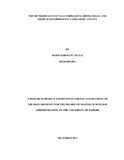| dc.description.abstract | This research investigated the determinants of tax compliance in small and medium
enterprises (SMEs), focusing on how tax knowledge and compliance costs affected
tax compliance behaviour of SMEs in Uasin Gishu County. The main objectives of
the study were to investigate how the unique business conditions of SMEs, the
perceptions of SME operators towards taxation, levels of tax knowledge and
compliance costs affect tax compliance of SME taxpayers. To achieve these
objectives, research propositions were stated which mainly stipulated that the current
tax system in Kenya does not cater for the special business needs of SMEs and that
strong correlations do exist among tax knowledge, compliance costs and tax
compliance. The study adopted a chiefly qualitative research design. Methodological
triangulation was employed, utilizing the interview method and a questionnaire
survey to collect primary data from SMEs in Uasin Gishu County. Interview
responses were analyzed through summative content analysis and questionnaire
responses were analyzed using SPSS software. The results indicated that SMEs face
different business conditions from large companies which cause them to bear high tax
compliance burdens. The results also indicated that the perceptions of SME operators
about tax fairness, tax service quality and government spending priorities greatly
affect their tax compliance decisions. Tax knowledge was discovered to have no
correlation with tax registration compliance but weak negative correlations with
filing compliance. Compliance costs were discovered to have negative correlations
with tax compliance. The study then recommended that the current tax law should be
amended to incorporate provisions that grant special tax incentives to SMEs in order
to improve voluntary tax compliance by SME taxpayers. The study also
recommended that the KRA should disseminate information on tax updates more
frequently in order to improve the levels of tax knowledge for voluntary tax
compliance | en |

